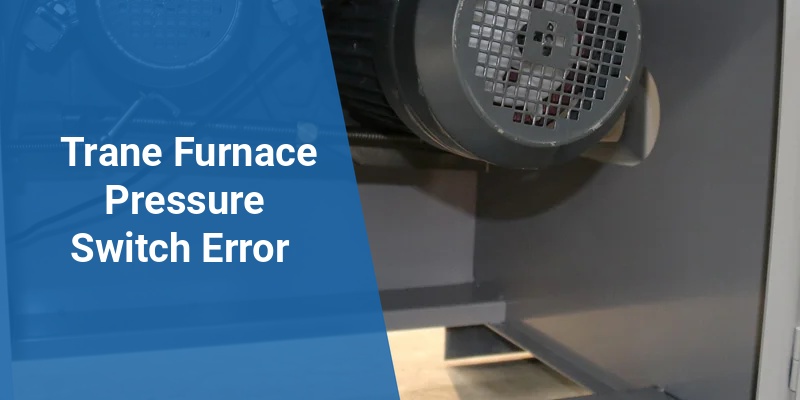Encountering a pressure switch error on a Trane furnace can be frustrating, but understanding the root causes and solutions can help homeowners restore comfort quickly. The pressure switch is a crucial safety component that ensures proper venting and combustion. This article explores common causes of a Trane furnace pressure switch error, how to diagnose it, and effective troubleshooting tips to resolve the issue safely.
| Aspect | Description |
|---|---|
| Component | Pressure switch in Trane furnaces |
| Function | Monitors vent pressure & ensures safe operation |
| Common Cause of Error | Blocked vent, faulty switch, wiring issues |
| Typical Symptoms | Furnace fails to start, error code on display |
| Primary Fixes | Inspect vent, clean switch, check wiring, replace switch |
What Is a Pressure Switch in a Trane Furnace?
The pressure switch is a safety sensor inside the Trane furnace that detects whether the inducer fan is creating the correct draft or pressure in the vent system. It prevents the furnace from igniting if there is insufficient airflow, blocking harmful gases like carbon monoxide from entering the home. The switch reads vent pressure through small tubing and either completes or breaks an electrical circuit accordingly.
Common Causes of Trane Furnace Pressure Switch Errors
Several factors can trigger a pressure switch error in Trane furnaces. Understanding these causes assists in diagnosing the problem accurately:
- Blocked or Restricted Vent Pipes: Snow, debris, bird nests, or dirt blocking the furnace exhaust can cause insufficient airflow.
- Faulty Pressure Switch: Wear, corrosion, or internal failure of the switch sensor can lead to false readings.
- Damaged Tubing: Cracks, holes, or disconnections in the small vacuum tubes connecting the switch to the inducer can disrupt pressure readings.
- Inducer Motor Malfunction: If the inducer fan does not start or runs weakly, the pressure switch won’t detect the requisite pressure.
- Electrical or Wiring Issues: Loose connections, corrosion, or damaged wires can cause communication failures between the pressure switch and control board.
Symptoms Indicating a Pressure Switch Error
Recognizing the symptoms can help identify a pressure switch issue quickly:
- Furnace Won’t Ignite: The system may try to start but then shut down before firing the burners.
- Error Codes: Many modern Trane furnaces display diagnostic codes, often flashing LED sequences or error messages pointing to a pressure switch fault (check the user manual for specific codes).
- Frequent Cycling: The furnace might repeatedly attempt ignition without success.
- Unusual Noises: Whistling or hissing sounds near the inducer fan may indicate vent blockage or pressure issues.
How to Troubleshoot a Trane Furnace Pressure Switch Error
Troubleshooting the pressure switch error involves a systematic inspection and process of elimination.
1. Turn Off Power and Gas Supply
Start by switching off the furnace power and gas supply for safety.
2. Inspect Vent and Exhaust Pipes
Check for blockages like nests, debris, ice, or snow around the vent terminals. Clean any obstructions that may restrict airflow.
Call 888-906-9139 for Free Local HVAC Quotes – No Obligation, Just Savings!
3. Examine Pressure Switch Tubing
Inspect the small vacuum hose running from the inducer to the switch. Look for cracks, clogs, kinks, or disconnects. Replace tubing if damaged or obstructed.
4. Test the Inducer Motor
Manually verify if the inducer motor starts and runs smoothly when the furnace cycles on. Replace or repair the inducer motor if it’s faulty.
5. Check Electrical Connections
Verify that wiring to the pressure switch and control board are secure, undamaged, and free from corrosion.
6. Measure Pressure Switch Functionality
Using a multimeter, test the pressure switch for continuity. When the inducer runs, the switch should close (show continuity), allowing the furnace to proceed to ignition.
When to Replace the Pressure Switch
If all external factors are addressed but the pressure switch still triggers errors, the switch itself may be defective. Signs for replacement include:
- Failure to close or open during induction motor operation.
- Visible signs of corrosion or wear.
- Repeated error codes after cleaning and verifying all components.
Replacing the pressure switch is typically straightforward, but it is advisable to hire a licensed HVAC technician to ensure safe and proper installation.
Preventive Maintenance to Avoid Pressure Switch Errors
Preventive care extends furnace life and reduces errors:
Call 888-906-9139 for Free Local HVAC Quotes – No Obligation, Just Savings!
- Regularly clean vents: Keep exhaust paths free of debris, bird nests, or ice build-up.
- Inspect tubing annually: Check for deterioration and replace as needed.
- Schedule professional furnace inspections: Annual HVAC tune-ups catch inducer and switch issues early.
- Maintain clear surroundings: Avoid blocking intake or exhaust vents with plants or coverings.
Understanding Trane Furnace Error Codes Related to Pressure Switch Malfunction
Trane furnaces often signal pressure switch errors via LED flashes or error codes displayed on the control board. Common codes include:
| Error Code | Possible Cause |
|---|---|
| Flashing Red LED 3 Times | Pressure switch stuck open or closed |
| Error Code 36 | Vent blockage detected by pressure switch |
| Error Code 37 | Pressure switch failed to close during each start attempt |
Refer to the furnace manual for exact troubleshooting steps corresponding to each code.
Professional Help and Safety Considerations
Working with furnace components like the pressure switch or inducer motor involves electrical and gas elements that pose safety risks. If troubleshooting steps do not resolve the error or if unfamiliar with HVAC systems, seek a qualified HVAC technician. They can perform thorough diagnostics and repairs to ensure safe, efficient furnace operation.
Always prioritize safety by turning off power and gas before inspection and avoid tampering with sealed or complex parts without professional expertise.
